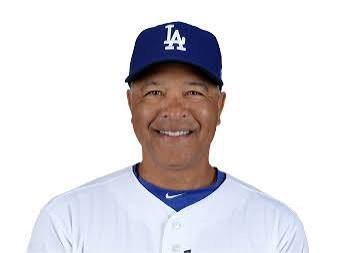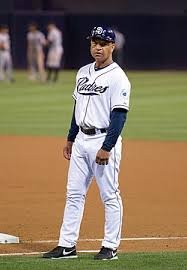
Introduction

When you think of game-changers in Major League Baseball, one name often stands out: Dave Roberts. He’s not only known for a legendary stolen base that helped the Boston Red Sox break their championship drought, but also for his diverse heritage, personal challenges—including a battle with cancer—and his successful transition into a top-tier manager for the Los Angeles Dodgers. In this article, we’ll trace Roberts’ journey: his origins, his mom and family roots, his playing career, his cancer fight, and how he became the manager he is today.
1. Where He’s From & Family Background
David Ray Roberts (commonly known as “Dave Roberts”) was born on May 31, 1972, in Naha, the capital city of Okinawa, Japan.
Heritage and upbringing
-
His father, Waymon Roberts, was an African-American United States Marine stationed in Okinawa; his mother, Eiko Ikehara, is Japanese, from Okinawa.
-
Because of his father’s Marine service, Roberts’ childhood involved frequent moves: from Okinawa to California, then North Carolina, Hawaii, and eventually settling in the San Diego area.
Early schooling and sports
-
In the San Diego area he attended Vista High School and then Rancho Buena Vista High School where he starred in football (as quarterback), basketball and baseball.
-
Though recruited by the Air Force Academy for football, he decided to focus on baseball.
Role of his mom
Roberts’ mother played a critical role in his upbringing — both culturally and emotionally. Her Okinawan heritage is something Roberts has spoken about with pride. In interviews he’s noted that having a Japanese mother and an African-American father has given him a unique perspective and a sense of responsibility to represent multiple communities.
2. College & Minor League: The Early Playing Career
Roberts attended the University of California, Los Angeles (UCLA) where he walked on to the Bruins baseball team.
-
As a sophomore he hit .331 and stole 36 bases; as a junior he hit .296 with 28 steals.
-
By his senior year he became UCLA’s all-time stolen base leader and graduated with a degree in history.
Drafted:
-
He was first selected by the Cleveland Indians in the 47th round of the 1993 draft but did not sign.
-
The Detroit Tigers drafted him in the 28th round of the 1994 draft, and he began his pro career shortly thereafter.
In the minor leagues he showed his trademark speed and base-stealing ability, including a season where he swiped 65 bases and led all minor leaguers.
3. Major League Playing Career
Roberts made it to the majors and played for multiple teams over the span of roughly from 1999 to 2008.
Key teams & moments
-
He played for the Cleveland Indians (now Guardians), Los Angeles Dodgers, Boston Red Sox, San Diego Padres and San Francisco Giants.
-
One of his most famous moments: In the 2004 American League Championship Series (ALCS), playing for the Red Sox, he came in as a pinch-runner, stole second base against the great closer Mariano Rivera, and scored the tying run — that kick-started Boston’s historic comeback from a 0-3 deficit to beat the Yankees and eventually win the World Series.
-
Over his full playing career he was a .266 hitter with 243 stolen bases.
Style & reputation
Roberts was known for his speed, base-running acumen, and high energy on the field. His clutch steal in 2004 is often cited as one of the most memorable single plays in MLB postseason history. His teammates and commentators have described him as someone who brings effort and enthusiasm every day.
End of playing days
-
His final major league game was September 28, 2008 for the Giants, where he singled and scored the winning run.
-
By March 2009 he was released, and soon transitioned away from playing into other roles.
4. Battle with Cancer
Roberts’ life off the field includes a courageous encounter with illness that shaped him deeply.
Diagnosis
In March 2010 he was diagnosed with Hodgkin’s lymphoma, a type of blood cancer. He had already undergone two rounds of chemotherapy by the time it became public.
Journey & recovery
-
Roberts said that the diagnosis came after a physical required for a front-office job and that it was discovered while he was working as a special assistant with the Padres.
-
Doctors told him that if the cancer had been discovered a few months later it might have progressed to Stage 3 or Stage 4.
-
By June 2011 he was declared cancer-free.
Impact
Roberts has spoken publicly about how the experience humbled him, grounded him, and heightened his perspective on life beyond baseball: the importance of health, family, faith and corporate culture of service. Dave Roberts baseball career.
5. Managerial Career & Legacy
After his playing career, Roberts gradually moved into coaching and then managing.
Transition into coaching
-
After retiring he served in various capacities: special assistant, first-base coach, bench coach for the Padres.
Manager of the Los Angeles Dodgers
-
On November 23, 2015 the Dodgers named Roberts as their manager.
-
In his first full season (2016) he led the team to the NL West title and was named National League Manager of the Year.
-
He guided the Dodgers to multiple pennants and a World Series title in 2020 (and then again later).
Significance & identity
Roberts made history as:
-
The first manager of Asian heritage in MLB to lead a team to the World Series.
-
The second Black manager to win a World Series.
His mixed heritage (Japanese mother, African-American father) and his professional success made him a significant figure in baseball’s evolving culture.
Style & influence
Roberts is praised for his communication skills, ability to manage star players, and the “grit and grind” attitude he brings. He values teamwork, accountability, and a clubhouse culture where every player matters. Dave Roberts baseball career.
6. What the Mom Means to Him
While much is written about Roberts’ father and upbringing, his mother’s influence is equally important:
-
His mother, being Okinawan Japanese, provided a cultural bridge and a unique identity for Roberts.
-
He has spoken about how her support, her heritage, and the fact that he has links to both the United States and Japan motivate him to be a role-model for diverse communities.
-
During Asian-American and Pacific-Islander heritage times, Roberts has used his platform to speak out, saying his mother’s experience as an Asian person gave him sensitivity to those issues.
7. Summary & Reflection
Dave Roberts’ story is one of perseverance, identity, versatility and leadership. From his birth in Okinawa to moving often as a military child; from his college success to becoming a major-league player known for an iconic stolen base; from battling cancer to rising into a championship-winning manager — his life touches many themes.
His background (Japanese mother, African-American father) adds an important dimension in a sport that increasingly reflects global diversity. The way he has integrated his heritage, his experience, his trials and triumphs into his managerial philosophy makes him a compelling figure. Dave Roberts baseball career.
FAQs
Q1. Where was Dave Roberts born?
A: He was born in Naha, Okinawa, Japan, on May 31, 1972.
Q2. What is his heritage?
A: His father was an African-American U.S. Marine; his mother is Japanese (Okinawan). Roberts thus has both African-American and Japanese heritage.
Q3. What was his most famous moment as a player?
A: As a member of the Boston Red Sox in the 2004 ALCS, he stole second base in Game 4 with the team trailing and later scored the tying run — a moment that helped launch the comeback and eventual World Series title.
Q4. Did he have cancer?
A: Yes. In March 2010 he was diagnosed with Hodgkin’s lymphoma. After treatment he was declared cancer-free in mid-2011.
Q5. When did he become manager of the Dodgers and what has he achieved?
A: He became manager of the Los Angeles Dodgers in November 2015. He led them to NL West titles, pennants, and a World Series championship in 2020. He was also named NL Manager of the Year in 2016.
Q6. How has his mother influenced his life?
A: His mother’s Okinawan Japanese background shaped his identity and gave him a sense of connection to Asia-Pacific culture. He speaks of her influence and how it motivates him to represent under-represented groups. Dave Roberts baseball career.
Closing Thoughts
Dave Roberts stands as an example of how personal history, cultural heritage, athletic achievement and personal struggle can converge into a meaningful legacy. Whether you follow baseball for the on-field action, or for the human stories behind the game, Roberts’ journey offers plenty: a dynamic childhood as a military kid, a standout college athlete, a major-league player with a defining moment, a cancer survivor, and a successful leader who transcends pure statistics.
